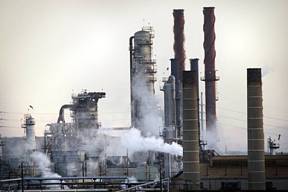Chevron meeting will be bellwether for Richmond
Chip Johnson
Friday, March 5, 2010

Liz Hafalia / The Chronicle
Chevron's Richmond refinery is at the center of a tax dispute between the cash-strapped East Bay city and the oil giant.
 View Larger Image
View Larger Image
Richmond city officials will watch closely next week when Chevron Corp. hosts its annual security analysts meeting.
The event is when the publicly held company reviews the results of the previous fiscal year and discusses its plans, goals and projections for the coming year, said Lloyd Avram, a Chevron spokesman.
It's particularly important for Richmond this year because last fall a Chevron official hinted that state and local government demands for more taxes and fees from the 3,000-acre refinery on the city's western border were threatening the plant's viability.
In a November New York Times story, Mike Wirth, an executive vice president with the company, said the combined total of state and local taxes exceeded profits at the Richmond facility. "Refineries that don't make money don't stay open," he told the newspaper.
Chevron's profits fell from $23.9 billion in 2008 to $10.5 billion in 2009 - and that seems to be a far more important factor in the future of the company's Richmond refinery than the local tax rate.
The Richmond refinery - which opened in 1902, three years before Richmond incorporated as a city - employs 1,300 people and contributed around $32 million in local and property taxes to the city's $144 million budget for the year ending in June. The refinery is the No. 3 producer in the company's refinery fleet, processing 243,000 barrels of oil a day.
In recent years, Richmond city officials have become emboldened, approving a business license tax that was struck down by the courts and requiring the oil company to pay a utility tax calculated by city officials, instead of a flat rate determined by the company. And with work halted by a court ruling last year that found a $1 billion retrofit project report environmentally incomplete, there is speculation that an announcement to close the refinery could be made soon after the company meeting next week.
But it is disingenuous to include Richmond's paltry tax bill in the financial misfortunes of Chevron and other oil giants that have seen profits plummet as global demand for fuel has decreased even as global manufacturing capacity has grown.
Some Richmond officials, including Mayor Gayle McLaughlin, are determined to forge a new tax agreement between the company and the city, which has an estimated $10 million budget shortfall this year.
"The residents, the council and I have made it clear that we will no longer be dominated by Chevron," McLaughlin said. "It's a new era and we will not be rolled back. We can co-exist, but we expect any business that operates in the city to play by the rules and pay its fair share."
The Richmond City Council voted to appeal the court decision that knocked down Measure T, the city business license tax challenged by Chevron as unconstitutional.
"I totally reject the fact that our taxes have anything to do with their (Chevron) bottom line," said longtime Councilman Tom Butt. "No one is trying to drive Chevron out of Richmond, and what they're going to do is based on a strategic plan. They may be losing their ass, but it's because of the worldwide energy market, not our tax rate."
With a population of 102,000 residents amid a thriving metropolis, Richmond is no longer the distant, rural outpost it was when Chevron opened its doors. Unless Chevron officials can make radical changes in their ability to operate in a dense, urban environment where clean earth and air are as important to residents as profits are to the company - then perhaps it is time for Big Oil to pull up stakes and move on down to El Segundo.
Chip Johnson's column appears in The Chronicle on Tuesday and Friday. E-mail him at chjohnson@sfchronicle.com.
Read more: http://www.sfgate.com/cgi-bin/article.cgi?f=/c/a/2010/03/05/BACA1CAVVB.DTL#ixzz0hJwiGR8o